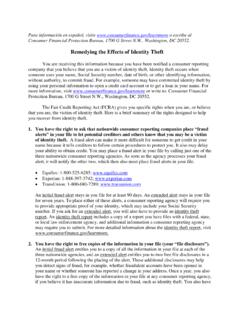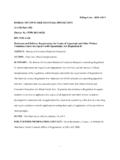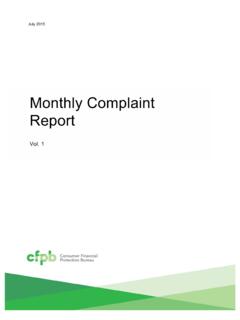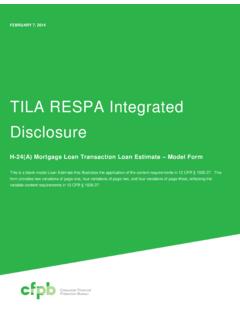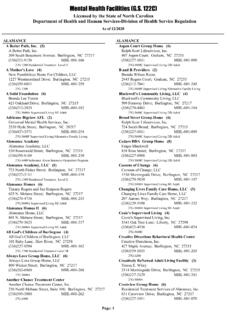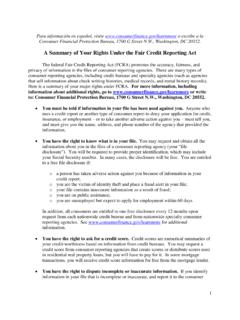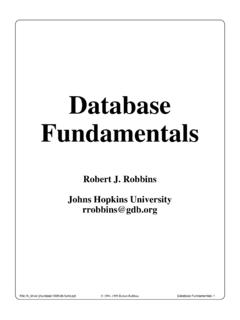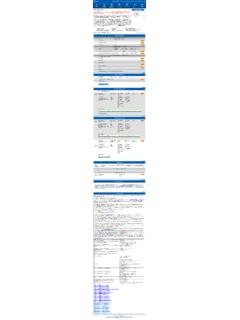Transcription of 1700 G Street, N.W., Washington, DC 20552
1 1 1700 g street , , Washington, DC 20552 CFPB Compliance bulletin 2015-06 Date: November 23, 2015 Subject: Requirements for Consumer Authorizations for Preauthorized Electronic Fund Transfers A. Introduction The CFPB is issuing this Compliance bulletin to industry to remind entities of their obligations under the Electronic Fund Transfer Act (EFTA) and Regulation E when obtaining consumer authorizations for preauthorized electronic fund transfers (EFTs) from a consumer s account. The CFPB has observed that some entities may not fully comply with the requirements imposed by EFTA and Regulation E. Others may be uncertain of their obligations under EFTA and Regulation E, as well as the intersections between Regulation E and the Electronic Signatures in Global and National Commerce Act (E-Sign Act).
2 1 For instance, this Compliance bulletin explains that oral recordings obtained over the phone may authorize preauthorized EFTs under Regulation E provided that these recordings also comply with the E-Sign Act. Further, this bulletin outlines entities obligations to provide a copy of the terms of preauthorized EFT authorizations to consumers. This Compliance bulletin summarizes the current law, highlights relevant supervisory findings, and articulates the CFPB s expectations for entities obtaining consumer authorizations for preauthorized EFTs to help them ensure their compliance with Federal consumer financial law. 2 B. Background The CFPB has supervisory authority over certain covered persons, including very large depository institutions, credit unions and their affiliates;3 certain nonbanks;4 and service EFTA is intended to protect individual consumers engaging in EFTs and remittance EFTs are defined broadly and generally include any transfer of funds 1 Although the CFPB s authority to interpret the E-Sign Act is limited, see 15 7001 et seq.
3 , this additional guidance based on current law will assist entities in complying with EFTA and Regulation E. 2 This Compliance bulletin specifically focuses on preauthorized EFTs from consumers accounts as governed by 12 CFR (b)-(d). This document does not address transfers to consumers accounts, which are governed by different rules. 3 12 5515(a). 4 12 5514. 5 12 5514(e), 5515(d). 2 initiated through an electronic terminal, telephone, computer, or magnetic tape for the purpose of ordering, instructing, or authorizing a financial institution to debit or credit a consumer s EFTA is implemented through Regulation E, which includes official The Dodd-Frank Wall Street Reform and Consumer Protection Act (Dodd-Frank Act) generally transferred rulemaking authority under EFTA from the Board of Governors of the Federal Reserve System ( the Board )
4 To the The CFPB is authorized, subject to certain exceptions, to enforce EFTA and Regulation E against any person subject to EFTA and Regulation Consumer Authorization Requirements for Preauthorized EFTs from a Consumer s Account. Entities must comply with EFTA and its implementing Regulation E when using preauthorized EFTs. Preauthorized EFTs refer to an electronic fund transfer authorized in advance to recur at substantially regular intervals. 11 During examinations, the CFPB has noted that many companies including those engaging in mortgage servicing, student loan servicing, debt collection, and short-term, small-dollar lending solicit authorizations from consumers for payment by preauthorized EFT.
5 Consumer Authorizations in Compliance with EFTA and Regulation E EFTA and Regulation E establish requirements for entities that obtain consumer authorizations for preauthorized These requirements include specific rules related to consumer authorizations. Regulation E requires that preauthorized EFTs from a consumer s account be authorized only by a writing signed or similarly authenticated by the consumer. 13 A copy of the authorization must also be provided to the 6 See generally 15 1693 et seq; see also 12 CFR (b) ( [EFTA].)
6 Establishes the basic rights, liabilities, and responsibilities of consumers who use electronic fund transfer and remittance transfer services and of financial institutions or other persons that offer these services. The primary objective of [EFTA and Regulation E] is the protection of individual consumers engaging in electronic fund transfers and remittance transfers. ). 7 See 15 1693a(7); 12 CFR (b). 8 See 12 CFR 1005 et seq. 9 Dodd-Frank Act 1002(12)(C), 1061, and 1084, 12 5481(12)(C), 5581, and 15 1693 et seq. Section 1029 of the Dodd-Frank Act generally excludes from this transfer of authority, subject to certain exceptions, any rule making authority over a motor vehicle dealer that is predominantly engaged in the sale and servicing of motor vehicles, the leasing and servicing of motor vehicles, or both.
7 The transfer of authority also did not include Section 920 of EFTA, which concerns debit card interchange fees charged to merchants. Section 920 of EFTA is implemented by Board regulations at 12 CFR part 235. 10 See EFTA 918(a)(5), 15 1693o(a)(5); see also 12 5536, 5564. 11 See 12 CFR (k). 12 See 15 1693e; 12 CFR (b) and (d). 13 See 12 CFR (b). 14 See id. 3 Under EFTA and Regulation E, companies can obtain the required consumer authorizations for preauthorized EFTs in several ways. Consumer authorizations can be provided in paper form or electronically. The commentary to Regulation E explains that the rule permits signed, written authorizations to be provided electronically, and specifies that the writing and signature requirements.
8 Are satisfied by complying with the [E-Sign Act] which defines electronic records and electronic signatures. 15 Regulation E does not prohibit companies from obtaining signed, written authorizations from consumers over the phone if the E-Sign Act requirements for electronic records and signatures are The E-Sign Act establishes that electronic signatures and electronic records are valid and enforceable if they meet certain An electronic signature is an electronic sound, symbol, or process, attached to or logically associated with a contract or other record and executed or adopted by a person with the intent to sign the record. 18 An electronic record is a contract or other record created, generated, sent, communicated, received, or stored by electronic means.
9 19 In at least one examination, Supervision has concluded that one or more entities did not violate EFTA or Regulation E merely because they obtained by telephone consumer authorizations that were signed or similarly authenticated by the consumer Regulation E may be satisfied if a consumer authorizes preauthorized EFTs by entering a code into their telephone keypad,21 or, Supervision concluded, the company records and retains22 the consumer s oral authorization, provided in both cases the consumer intends to sign the record as required by the E-Sign Act. In addition, any recording of telephone conversations with consumers should be conducted in accordance with applicable State laws.
10 Whether an authorization is provided in paper form or electronically, to comply with Regulation E, the 15 12 CFR part 1005, Supp. I, comment 10(b)-5. The E-Sign Act establishes that electronic signatures and electronic records are valid and enforceable if they meet certain criteria. See 15 7001(a)(1). An electronic signature is an electronic sound, symbol, or process, attached to or logically associated with a contract or other record and executed or adopted by a person with the intent to sign the record. 15 7006(5). An electronic record is a contract or other record created, generated, sent, communicated, received, or stored by electronic means.
